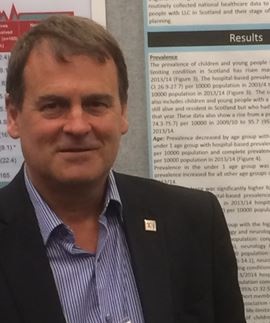02.11.16
Improving palliative care for children in Scotland
 Dr Pat Carragher, medical director at the Children’s Hospice Association Scotland (CHAS), explains how Scotland is becoming a leader in palliative care.
Dr Pat Carragher, medical director at the Children’s Hospice Association Scotland (CHAS), explains how Scotland is becoming a leader in palliative care.
Leaving an unseasonably warm Scotland behind, I travelled to Montréal recently to address 1,700 health and medical professionals from around the globe at the 21st International Congress on Palliative Care, to discuss the findings of the ChiSP study – the leading piece of research in children’s palliative care in Scotland.
Last year, the University of York published the results of the ChiSP Study, ‘Children in Scotland requiring Palliative Care: identifying numbers and needs’, which was commissioned by Children’s Hospice Association Scotland (CHAS) and funded by the Scottish government.
CHAS is unique in that it is the only national hospice service provider in Scotland which is able to offer care for babies, children and young people, and the charity is hugely committed to providing the best standard of care to all those who need it. The in-depth research project was the first time a study of this nature had been carried out in Scotland – putting the country on the map as a world-leader in children’s palliative care.
Since MSP Shona Robison (Scottish cabinet secretary for health, wellbeing and sport), launched the ChiSP study in November 2015, its findings have continued to highlight the absolute need for high-quality holistic palliative care for under-25s in Scotland.
The ChiSP study demonstrated that in 2013-14 there were 15,404 under-25s with a life-shortening condition, a far higher number than previously estimated. The increase is due to a number of factors including advances in medicine, with many children now living longer than previously expected. The study also highlights the need for improved awareness, access to and availability of palliative care services for babies, children and young people, but especially for those babies who are less than one year old.
At the conference, one of ChiSP’s principal investigators, Dr Lorna Fraser from York University, presented the study’s results, while I compared and contrasted its knock-on effect in terms of care with medical directors from Michigan and Vancouver.
CHAS is committed to acting on the ChiSP study’s findings, and looking to the future of the charity. At the conference I spoke on the topic of ‘ChiSP – where next for a national children’s palliative organisation?’ The presentation drew huge interest from colleagues in this field, not least because it is the only national study in palliative care needs of babies, children and young people in the world, but, because others are actively considering replicating it in their areas.
Since its publication, the ChiSP study has attracted global interest, not only taking me to Montréal, but earlier this year, I had the opportunity to discuss it with delegates from around the world at the 2nd International Children’s Palliative Care Network in Buenos Aires, Argentina. ChiSP will also feature at the 3rd Congress of Paediatric Palliative Care in Rome (18-21 November 2016), where four abstracts have been accepted to illustrate different features of its findings.
These will highlight the increase in numbers of the under-25s with palliative care needs, and from within this number the importance of care for the under ones, the need for age specific care for young people (aged 16-25 years), culturally sensitive services for ALL ethnic groups, and the further development of services for babies, children and young people from areas of high deprivation. Additionally, these presentations will highlight five recommendations calling for improved psychological and emotional care for children and their families.
ChiSP has been gaining notoriety around the world, and one of its biggest compliments so far is its recognition from the Scottish government’s Strategic Framework for Action, to improve palliative care for all in the 0-25 year age range by 2020.
Have you got a story to tell? Would you like to become an NHE columnist? If so, click here.